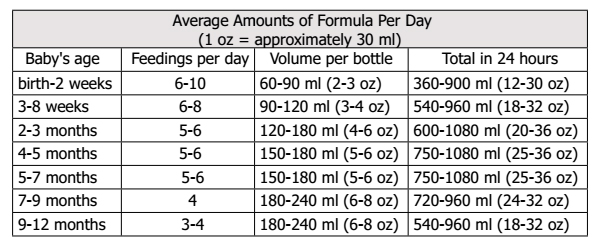Each baby is different. Newborns have small, frequent feedings. As the baby grows, feedings become larger, and
less frequent. Let your baby decide how much formula and how often.
A baby’s appetite will change with age, activity, and growth. Babies have growth spurts around 2, 3 and 6 weeks,
and at 3 and 6 months. They may want extra feedings at these times.
Bottle-fed babies are getting enough if they grow steadily and have at least 5 to 6 heavy, wet diapers per day.
Stools are generally dark, firm, and easily passed.
The following chart suggests amounts of formula to offer. Your baby may not drink as much as you offer Do not insist
your baby finish the bottle; it is best to follow your baby’s cues.
less frequent. Let your baby decide how much formula and how often.
A baby’s appetite will change with age, activity, and growth. Babies have growth spurts around 2, 3 and 6 weeks,
and at 3 and 6 months. They may want extra feedings at these times.
Bottle-fed babies are getting enough if they grow steadily and have at least 5 to 6 heavy, wet diapers per day.
Stools are generally dark, firm, and easily passed.
The following chart suggests amounts of formula to offer. Your baby may not drink as much as you offer Do not insist
your baby finish the bottle; it is best to follow your baby’s cues.
In the first 24 hours, the baby’s stomach is very small. The baby should only be eating 15 -30 ml (1/2 - 1 oz) per feed on
the first day of life.
Babies should have only formula or human milk until they are 6 months old.
the first day of life.
Babies should have only formula or human milk until they are 6 months old.


